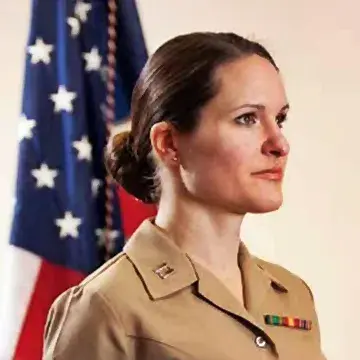Confronting the Enemy Within

It’s never easy taking a sexual assault case to court, but for a young woman or man in the Marines, it’s harder still. “It’s a terrible, awful experience to have to go through,” said Adrienne Serbaroli ’07, a captain and judge advocate in the Marine Corps. “It’s traumatic.”
A few years ago, “Adi” Serbaroli became one of only 15 Marine lawyers from around the country handpicked to launch the Marine Corps Victims’ Legal Counsel Organization. The program provides experienced Marine lawyers to advise and represent victims in sexual assault cases.
“We are essentially pioneers of something that has never been done in the military before,” said Serbaroli. “[The program] is in direct response to the complaints voiced by victims through the media and to Congress over the past two to three years.”
As in civilian life, sexual assault cases can be complex and murky, Serbaroli explained, often involving he-said/she-said scenarios, with memories sometimes muddled by alcohol. In the Marines, an added layer of complexity stems from the differences in stature and power inherent in the military system.
“There’s a culture of blame against the victim,” Serbaroli said. And the complex legal process itself “can be very confusing and intimidating,” she said. “I’m somebody who’s going to guide them through that process. I can figure out if there’s a way for me to help them make the right decision. I can protect them.”
Her clients are often young, relatively inexperienced and in need of much support. Only six percent of Marines are women, so they can feel especially isolated. Male victims – Serbaroli has had three male clients so far – can find the process even more difficult. Cases often take a year or two to find resolution, and it’s an exhausting process. “I do a lot of empowering of [my clients],” said Serbaroli. “It’s hard, it’s very emotionally draining, but I feel like it’s necessary.”
Serbaroli said her education prepared her well for this challenging role. Growing up in New York, she attended all-girl schools, and graduated from Barnard, an all-women college at Columbia University. When she decided to pursue a law degree at Roger Williams, she was unsure of her ultimate goals.
“I didn’t have a direction, but I knew I wanted to do big things. I needed to challenge myself, and I thought a law degree would give me a lot of options.” With graduation looming, she decided to check out military careers.
“The Marine Corps requires its officers to go through all the intense, rigorous physical training – they put us through a wringer – and that appealed to me,” she said. “I enjoy being pushed like that. You learn real, practical leadership.” After graduating from RWU in spring 2007, she went straight to Officer Candidate School, and then passed the bar on her first try the following year.
